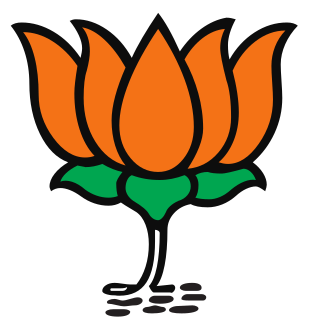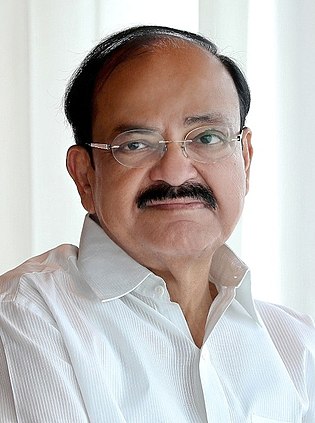Chitlapakkam C. Rajendran is an Indian politician and former member of the Parliament of India from Chennai South Constituency. [1] He represents the All India Anna Dravida Munnetra Kazhagam party.
Chitlapakkam C. Rajendran is an Indian politician and former member of the Parliament of India from Chennai South Constituency. [1] He represents the All India Anna Dravida Munnetra Kazhagam party.
The Politics of India works within the framework of the country's Constitution. India is a parliamentary Democratic Republic in which the President of India is the head of state and the Prime Minister of India is the head of government. It is based on the federal structure of government, although the word is not used in the Constitution itself. India follows the dual polity system, i.e. a(federal in nature) that consists of the central authority at the centre and states at the periphery. The Constitution defines the organisational powers and limitations of both central and state governments; it is well recognised, fluid and considered supreme, i.e., the laws of the nation must conform to it.

The President of India, officially the President of the Republic of India, is the ceremonial head of state of India and the commander-in-chief of the Indian Armed Forces. Ram Nath Kovind is the 14th and current president.

The Bharatiya Janata Party is one of two major political parties in India, along with the Indian National Congress. It is the current ruling political party of the Republic of India, having been so since 2014. The BJP is a right-wing party, and its policy has historically reflected Hindu nationalist positions. It has close ideological and organisational links to the much older Rashtriya Swayamsevak Sangh (RSS). As of 2019, it is the country's largest political party in terms of representation in the national parliament and state assemblies and is by far the world's largest party in terms of primary membership, with the second largest party, the Communist Party of China, having about half the registered members of the BJP.

The Indian National Congress is a political party in India with widespread roots. Founded in 1885, it was the first modern nationalist movement to emerge in the British Empire in Asia and Africa. From the late 19th century, and especially after 1920, under the leadership of Mahatma Gandhi, Congress became the principal leader of the Indian independence movement. Congress led India to independence from the United Kingdom, and powerfully influenced other anti-colonial nationalist movements in the British Empire, making it one of the world's oldest active political parties. The party has been overshadowed by the governments based on a haphazard mixture of Gandhism, socialism and capitalism. It stands for mixed economy and envisages a dominant role for the public sector. Its policies nationalized banks and insurance companies to curb monopoly and concentration of wealth.

Rahul Gandhi is an Indian politician and a member of the Indian Parliament, representing the constituency of Wayanad, Kerala in the 17th Lok Sabha. A member of the Indian National Congress, he served as the President of the Indian National Congress from 16 December 2017 to 3 July 2019. Gandhi is the chairperson of the Indian Youth Congress, the National Students Union of India also a trustee of Rajiv Gandhi Foundation and Rajiv Gandhi Charitable Trust.

The Communist Party of India (Marxist) is a communist political party in India. It is one of the national parties of India. The party emerged from a split from the Communist Party of India in 1964. The CPI(M) was formed in Calcutta from 31 October to 7 November 1964.

The Bahujan Samaj Party (BSP) is a national level political party in India that was formed to represent Bahujans, referring to Scheduled Castes, Scheduled Tribes, and Other Backward Classes (OBC), along with religious minorities. According to Kanshi Ram, when he founded the party in 1984, the Bahujans comprised 85 percent of India's population, but were divided into 6,000 different castes. The party claims to be inspired by the philosophy of Gautama Buddha, B. R. Ambedkar, Mahatma Jyotiba Phule, Narayana Guru, Periyar E. V. Ramasamy and Chhatrapati Shahuji Maharaj. Kanshi Ram named his protégée, Mayawati, as his successor in 2001. The BSP has its main base in the Indian state of Uttar Pradesh where it was the second-largest party in the 2019 Indian general election with 19.3% of votes and in the 2017 Uttar Pradesh elections with over 22% of votes. Its election symbol is an elephant.

Narendra Damodardas Modi is an Indian politician serving as the 14th and current prime minister of India since 2014. He was the chief minister of Gujarat from 2001 to 2014 and is the Member of Parliament for Varanasi. Modi is a member of the Bharatiya Janata Party (BJP) and its National Democratic Alliance (NDA). He is also a member of the Rashtriya Swayamsevak Sangh (RSS), a Hindu nationalist volunteer organisation. He is the first prime minister born after India's independence in 1947, the second non-Congress one to win two consecutive terms after Atal Bihari Vajpayee and the first from outside the Congress to win both terms with a majority in the Lok Sabha.

The Vice President of India, officially the Vice President of the Republic of India, is the second-highest constitutional office in India after the President. Article 63 of Indian Constitution states that "There shall be a Vice President of India." The Vice President acts as President in the absence of the president due to death, resignation, impeachment, or other situations.

The All India Trinamool Congress is an Indian political party which is predominantly active in West Bengal. The party is led by current chief minister of West Bengal Mamata Banerjee. Following the 2019 general election, it is currently the fourth-largest party in the Lok Sabha with 20 seats. Since its inception the party has been at the forefront of the anti-communist movement in West Bengal.
India has a parliamentary system as defined by its constitution, with power distributed between the central government and the states.

General elections were held in India in nine phases from 7 April to 12 May 2014 to elect the members of the 16th Lok Sabha. With 834 million registered voters, they were the largest-ever elections in the world until being surpassed by the 2019 elections. Around 23.1 million or 2.7% of the total eligible voters were aged 18–19 years. A total of 8,251 candidates contested the 543 elected Lok Sabha seats. The average election turnout over all nine phases was around 66.40%, the highest ever in the history of Indian general elections.

General elections were held in India in seven phases from 11 April to 19 May 2019 to elect the members of the 17th Lok Sabha. Votes were counted and the result declared on 23 May. Around 912 million people were eligible to vote, and voter turnout was over 67 percent – the highest ever, as well as the highest ever participation by women voters.

The Election Commission of India is a permanent and independent body established by the Constitution of India directly to ensure free and fair elections in the country. Article 324 of the Constitution provides that the power of superintendence, direction, and control of elections to parliament, state legislatures, the office of the president of India, and the office of vice-president of India shall be vested in the election commission. Thus, the Election Commission is an all-India body in the sense that it is common to both the Central government and the state governments.

A Member of Parliament in Lok Sabha is the representative of the Indian people in the Lok Sabha; the lower house of the Parliament of India. Members of parliament of Lok Sabha are chosen by direct elections on the basis of the adult suffrage. Parliament of India is bicameral with two houses; Rajya Sabha and the Lok Sabha. The maximum permitted strength of members of parliament in the Lok Sabha is 550. This includes maximum 530 members to represent the constituencies and states and up to 20 members to represent the union territories. Between 1952 and 2020, two seats were reserved for members of the Anglo-Indian community. The current elected strength of the Lok Sabha is 543. The party—or coalition of parties—having a majority in the Lok Sabha chooses the Prime Minister of India.

The General election to the Legislative Assembly of West Bengal for 292 constituencies of the 294 constituencies in West Bengal was held between 27 March to 29 April 2021 in eight phases. Voting for the two remaining constituencies was delayed and was scheduled to be held on 16 May 2021.